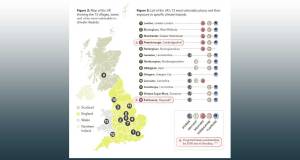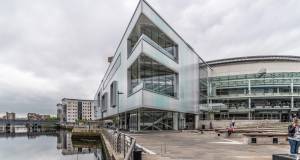
- Government
- Posted
Deep retrofit crucial to green recovery, climate committee says
Advice also calls for upskilling for retrofit & low carbon heating
This article was originally published in issue 34 of Passive House Plus magazine. Want immediate access to all back issues and exclusive extra content? Click here to subscribe for as little as €10, or click here to receive the next issue free of charge
Ministers must seize the opportunity to turn the Covid-19 crisis into a defining moment in the fight against climate change, the Committee on Climate Change (CCC) has said, as it called for a major drive to retrofit the UK’s building stock.
In its annual report to parliament, the CCC provided comprehensive new advice on delivering an economic recovery that accelerates the transition to a “net-zero emissions” society and strengthens resilience to the impacts of climate change.
“The UK is facing its biggest economic shock for a generation," said CCC chairperson Lord Deben. “Meanwhile, the global crisis of climate change is accelerating. We have a once-in-a-lifetime opportunity to address these urgent challenges together; it’s there for the taking. The steps that the UK takes to rebuild from the Covid-19 pandemic can accelerate the transition to a successful and low-carbon economy and improve our climate resilience. Choices that lock in emissions or climate risks are unacceptable.”
The committee assessed a wide set of measures and gathered evidence on the role of climate policies in the economic recovery. Its report highlighted five “clear investment priorities”:
- Low-carbon retrofits and building. The CCC said that there are “vital new employment and reskilling opportunities across the country if governments support a national plan to renovate buildings and construct new housing to the highest standards of energy and water efficiency, to begin the shift to low-carbon heating systems, and to protect against overheating”. It also called for the rollout of “green passports” for buildings, and of local area energy plans.
- Tree planting, peatland restoration, and green infrastructure. “Investing in nature, including in our towns and cities, offers another quick route to opportunities for highly-skilled employment, and outcomes that improve people’s lives,” the committee said.
- Energy networks must be strengthened to support electrification of transport and heating, the CCC said. “New hydrogen and carbon capture and storage (CCS) infrastructure will provide a route to establishing new low-carbon British industries, while fast-tracked electric vehicle charging points will hasten the move towards a full phase out of petrol and diesel cars and vans by 2032 or earlier,” the report added.
- Infrastructure to make it easy for people to walk, cycle, and work remotely. “Dedicated safe spaces for walking and cycling, more bike parking and support for shared bikes and e-scooters can help the nation get back to work in a more sustainable way,” the committee said. “For home working to be truly a widespread option, resilient digital technology (5G and fibre broadband) will be needed.”
- Moving towards a circular economy. The CCC stated: “Within the next five years, we can not only increase recycling rates rapidly but stop sending biodegradable wastes to landfill. Local authorities need support to invest strategically in a good-quality, low-carbon services for waste collection and disposal and to create new regional jobs.”
The CCC said that there are also opportunities to support the transition and recovery by investing in the UK’s workforce, and in lower-carbon behaviour and innovation, such as through:
- Reskilling and retraining programmes. The CCC said: “The net-zero economy will require a net-zero workforce, able to install smart low-carbon heating systems and to make homes comfortable; to design, manufacture and use low-carbon products and materials; and to put carbon back, rather than taking carbon out, from under the North Sea. Now is the time to build that workforce and to equip UK workers with vital skills for the future.”
- Leading a move towards positive behaviours. “There is a window for government to reinforce the ‘climate-positive’ behaviours that have emerged during the lockdown, including increased remote working, cycling and walking. The public sector must lead by example by encouraging remote working. It also needs to innovate in order that customer service can be provided effectively remotely,” the committee said.
- Targeted science and innovation funding. The CCC said: “Kick-starting research and innovation now in low-carbon and adaptation technologies will facilitate the changes needed in the decades ahead and build UK competitive advantage.”
“Covid-19 has shown that planning for systemic risks is unavoidable,” said chair of the CCC’s adaptation committee, Baroness Brown of Cambridge. “We have warned repeatedly that the UK is poorly prepared for the very serious impacts of climate change, including flooding, overheating and water shortages.
“Now is the moment to get our house in order, coordinate national planning, and prepare for the inevitable changes ahead. The UK’s domestic ambition can be the basis for strong international climate leadership, but the delivery of effective new policies must accelerate dramatically if we’re to seize this chance.”
The full report is available to read at www.theccc.org.uk.
Related items
-
 September’s AECB environmental construction conference seeks to spark debate among industry experts
September’s AECB environmental construction conference seeks to spark debate among industry experts -
 Climate report warns overheating crisis threatens UK
Climate report warns overheating crisis threatens UK -
 Sustainable building leaders crowned at Exemplar Awards
Sustainable building leaders crowned at Exemplar Awards -
 Barratt launches record passive house scheme
Barratt launches record passive house scheme -
 Green homes and finance join forces for growth
Green homes and finance join forces for growth -
 Irish and British associations unite for conference as passive house explodes
Irish and British associations unite for conference as passive house explodes

